Drive sales on autopilot with ecommerce-focused features
See FeaturesRead summarized version with
MailerLite has been popular among marketers for designing email campaigns, building automations, and easily managing subscribers.
For anyone still wondering, what is MailerLite, think of it as a lightweight alternative to other email marketing tools. In this MailerLite review, I share my honest take on the platform, explaining the whys and what’s behind it.
During testing, I really liked how clean the interface felt and how easy it was to set up automations. However, I did find that the design options aren’t the most flexible, and the integrations list is smaller compared to bigger platforms.
However, if affordability is your primary concern, this is where MailerLite stands out. It’s cheaper than most email marketing tools, with a generous free plan and paid tiers that deliver great value for your money.
Overall, this MailerLite review shows it’s a great option for small to mid-sized businesses. It does have a few gaps, but the mix of price, features, and ease of use makes it a smart pick in 2025.
Key features
- Drag-and-drop email editor: Quickly design custom emails by dragging content blocks and using customizable templates without coding
- Landing page and form builder: Create branded landing pages and forms to capture leads and grow your email lists
- Automation workflows: Set up automated workflows triggered by actions like signups, link clicks, or purchases, along with ready-to-use email templates
- Third-party integrations: Connect with platforms like Shopify, WooCommerce, WordPress, Facebook, and more for data syncing and a smooth automation process
- Analytics dashboard: Access detailed metrics, such as open rates, click-through rates, and conversions, to help you track campaign performance
- Audience segmentation: Group subscribers by behavior, demographics, or other criteria to send targeted emails that drive engagement
MailerLite ratings and user reviews
I’ve gathered MailerLite reviews from top platforms to give you an honest view of how users rate this email marketing tool. Below, you’ll find reviews of MailerLite based on customer ratings from verified sources:
Customer ratings
G2: 4.6/5 | Capterra: 4.7/5 | TrustRadius: 8.6/10
Here’s what users like about MailerLite:
- User-friendly interface: Users often praise MailerLite’s intuitive design. I especially love its drag-and-drop editor and automation features. Here’s a G2 MailerLite review appreciating its ease of use and user-friendly interface:
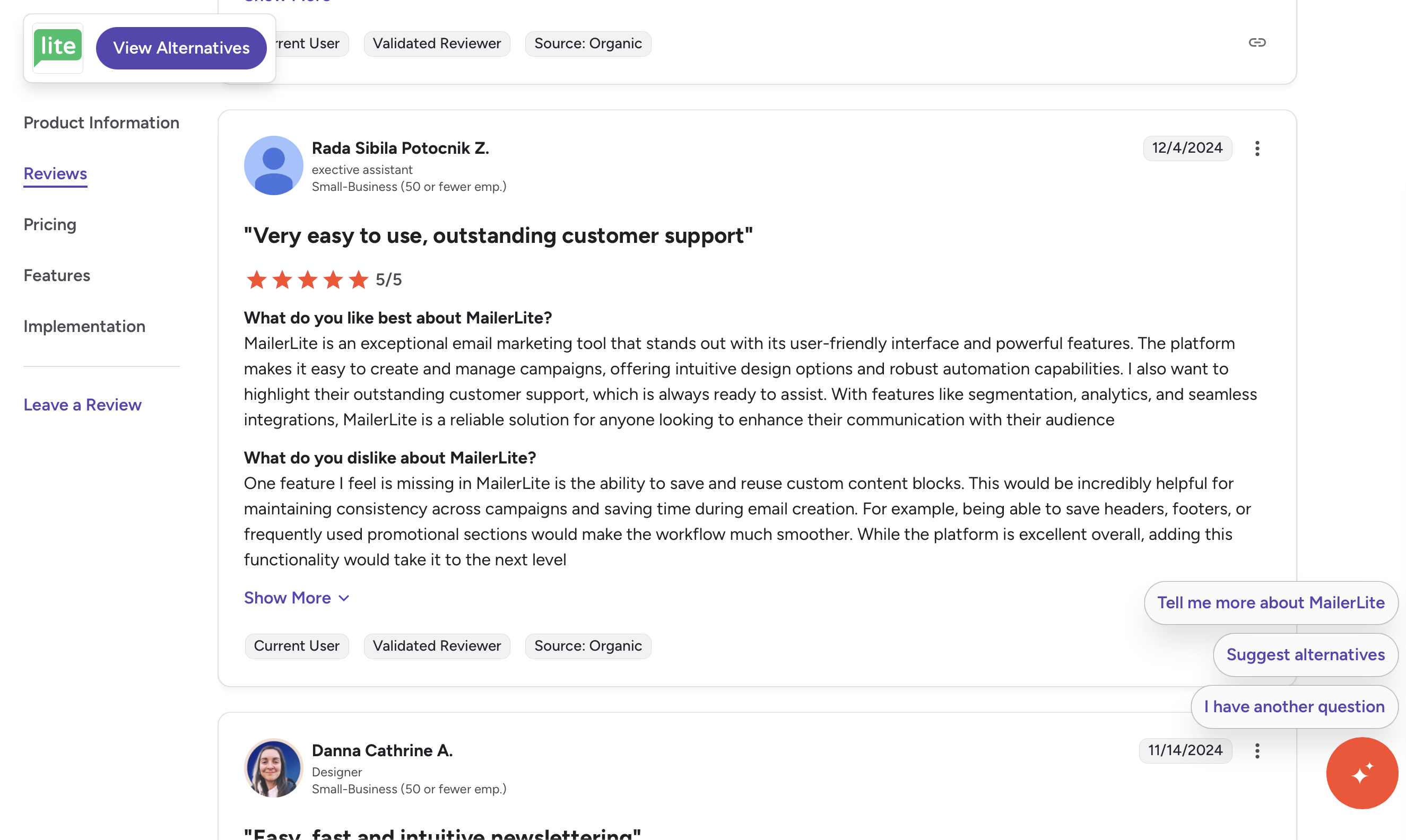
- Strong value and affordability: According to a MailerLite review on Capterra, the platform offers great value for the price. Several users also mention that the free plan is a great start for many small business owners:
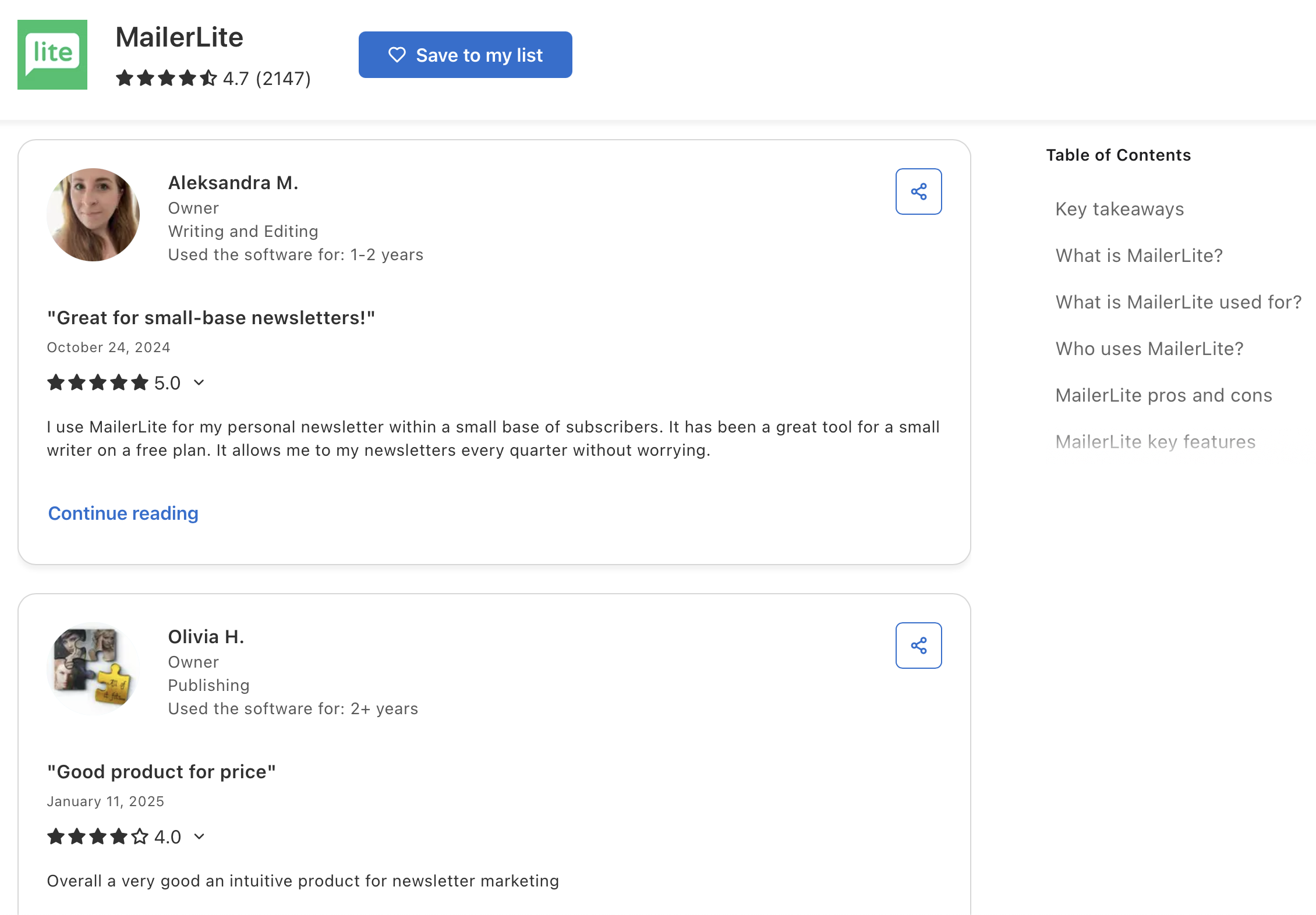
- Excellent deliverability and automation: MailerLite reviews on TrustRadius highlight its reliable email delivery rates and easy-to-use automation features. Users appreciate how these tools help maintain strong engagement without any complexities:
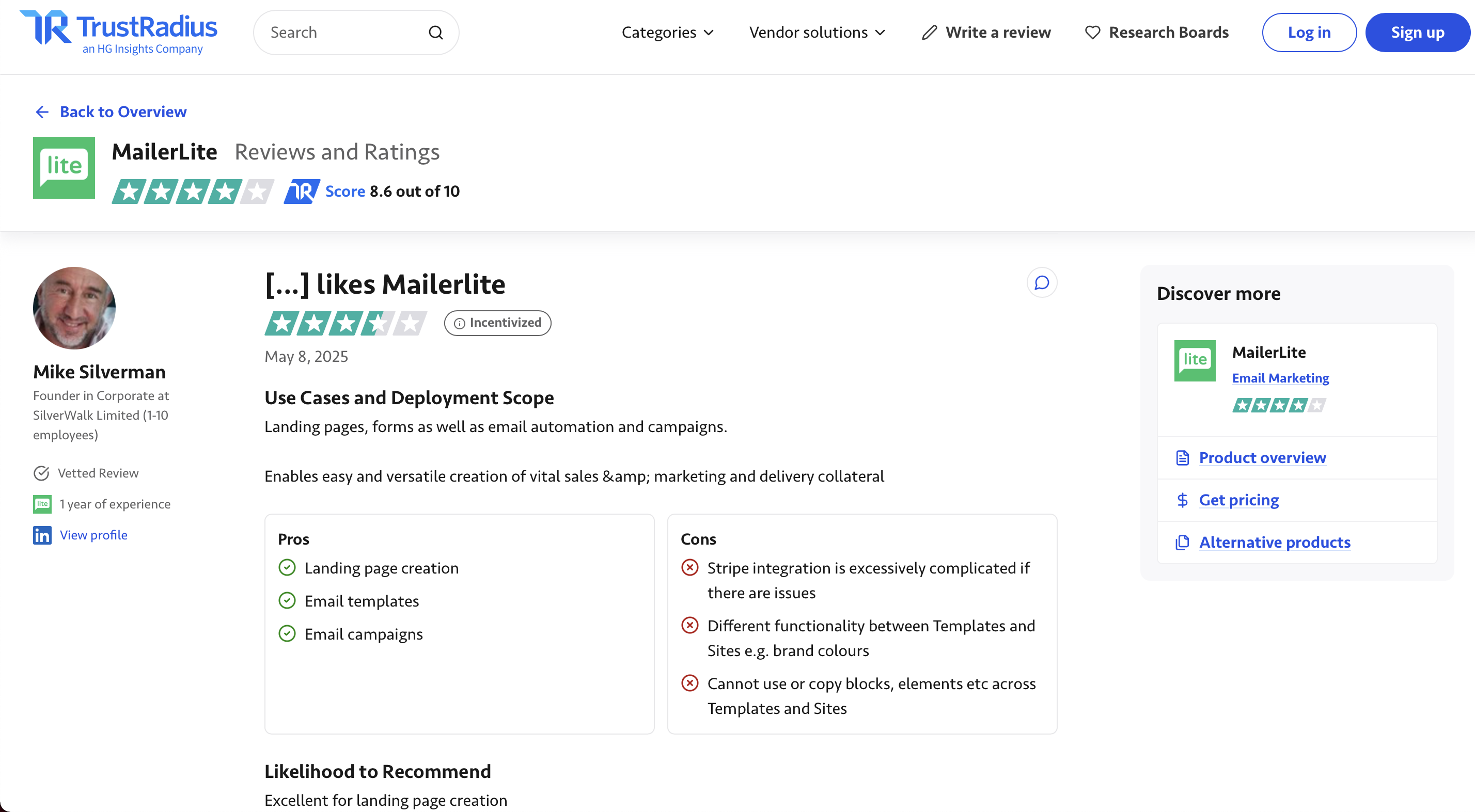
Here’s what users dislike about MailerLite:
- Strict approval process: MailerLite’s onboarding and approval system is stricter than many competitors, making it inconvenient for users who want to start right away.
According to Capterra’s MailerLite review, 60% of 88 reviews mentioning account approval were negative. Users reported difficulties with approval, unexpected suspensions, and challenges managing multiple accounts:
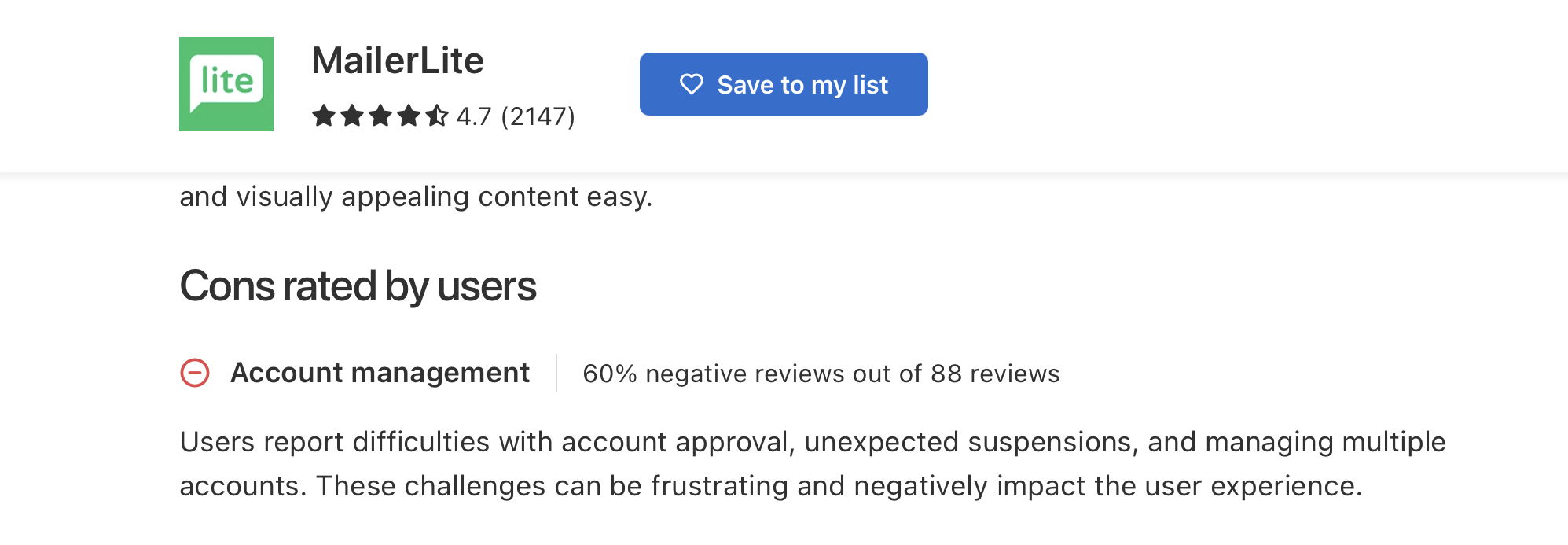
- Limited customer support availability: Several MailerLite review entries mention delayed responses, especially on lower-tier plans. Free plan users won’t have access to live chat, but they’ll have email support. Some say urgent issues stay unresolved for days, which can potentially disrupt campaigns:
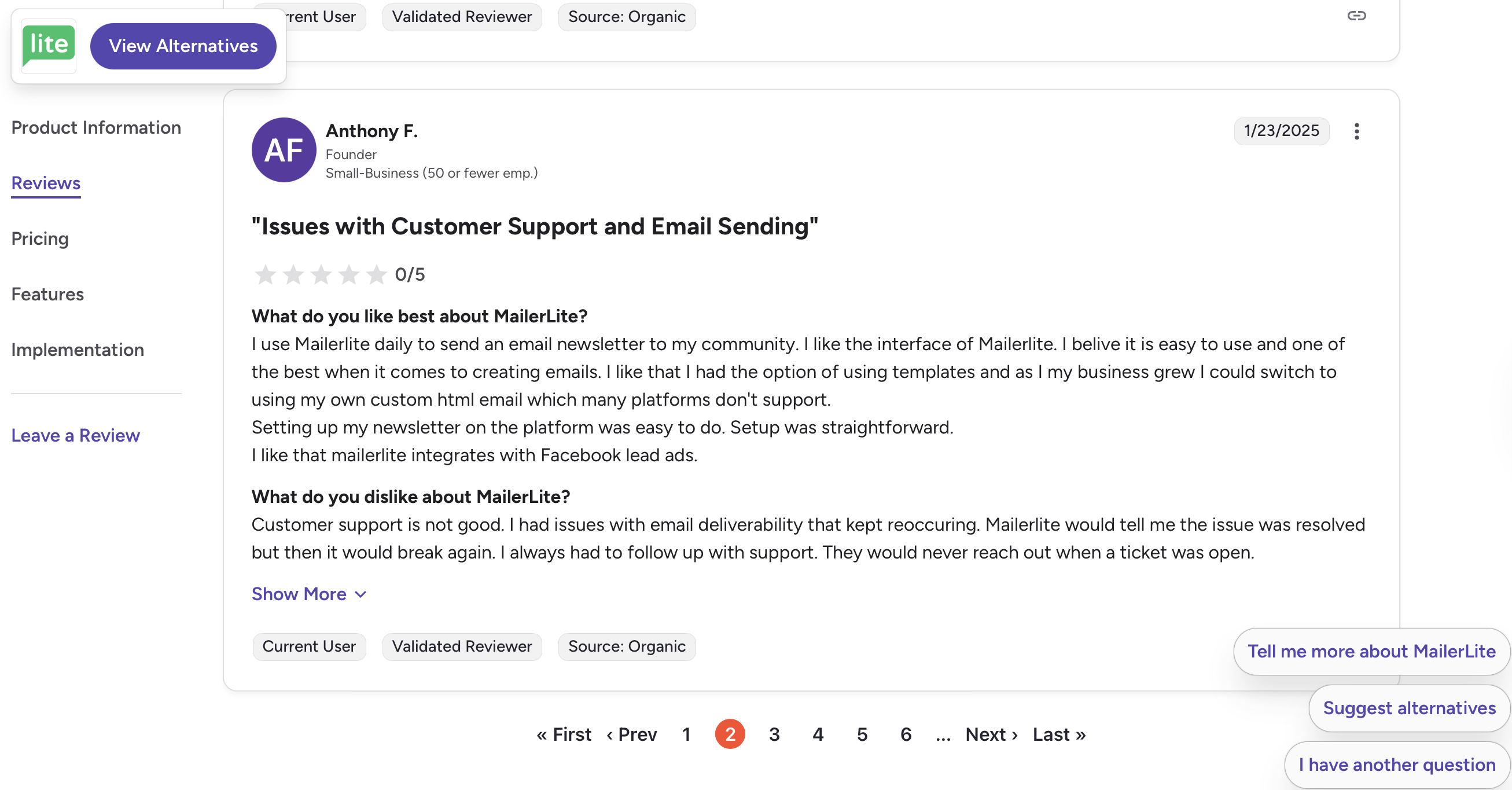
MailerLite review: Pricing
MailerLite offers three pricing plans: Free, Growing Business, and Advanced. Each plan comes with different features and limits. Here’s a breakdown of the features:
| Features | Free plan | Growing Business plan | Advanced plan |
|---|---|---|---|
| Price and billing | $0 | $9/month | $18/month |
| Contacts limit | Up to 1,000 subscribers | Scales with price, starting at 500 subscribers | Scales with price, starting at 500 subscribers |
| Monthly email sends | 12,000 | Unlimited | Unlimited |
| User seats | One | Three | Unlimited |
| Email editor | Drag-and-drop | Drag-and-drop, unlimited templates | Drag-and-drop, custom HTML editor |
| Email automation | Basic automation builder | Advanced automation, campaign auto-resend | Advanced automations, smart sending |
| Websites and landing pages | One website and 10 landing pages | Unlimited websites and landing pages | Unlimited websites and landing pages |
| Digital products sales | No | Yes | Yes |
| Popups, forms, and builders | Signup forms, popups | Popups, unsubscribe page builder | Promotion popups, preference center |
| Dynamic emails and testing | No | Yes | Yes |
| AI writing assistant | No | No | Yes |
| Integrations | Limited | 500+ integrations | 500+ integrations |
| Support | 24/7 email and chat (first 14 days) | 24/7 email support | 24/7 live chat and email support |
| Trial period | 14 days | 14 days | 14 days |
| Other perks | Comparative reporting | Campaign autosend | Partner discounts |
Here are some of the key restrictions in each plan:
Free
- Limited to 1,000 subscribers
- Maximum of 12,000 monthly emails
- No access to email templates
- Only one user seat
- Support is limited to 14 days of chat and email
Growing Business
- Pricing increases as subscriber count grows beyond 500
- Limited to three user seats
- No access to advanced features like an AI writing assistant and smart sending
- The onboarding and approval process can be slower compared to competitors
Advanced
- Custom pricing may not fit all budgets
- Starts at $18/month for 500 subscribers, grows with contacts
- Some advanced features may require technical knowledge
According to my MailerLite review, the platform delivers substantial value with the Growing Business plan. However, I’d like to note that pricing increases as your contact list expands.
The Free plan works well for testing, but its limits make it impractical for sustained email marketing growth. The Advanced plan provides powerful features, which are best suited for businesses that can fully leverage its automation and segmentation features.
Overall, the Growing Business plan offers the best balance between affordability and functionality for most users.
MailerLite pros and cons
After my review of MailerLite, here’s a breakdown of its strengths and weaknesses based on my experience with the platform:
| Pros | Cons |
|---|---|
| MailerLite offers affordable pricing, which makes it a great option for small and growing businesses | It lacks advanced ecommerce tools, which may limit online stores that need specialized features |
| The platform provides a broad feature set, covering email campaigns, landing pages, and automations in one place | On lower plans, automation complexity is limited, restricting more advanced workflows |
| Its user-friendly interface makes it simpler to create and manage campaigns, even for beginners | Reporting and analytics are basic, offering limited data for in-depth tracking |
| MailerLite ensures seamless integrations with ecommerce platforms, making it easy to connect your store | There’s no built-in spam or email preview testing, which can affect optimization |
| It delivers powerful automation tools for users on higher-tier plans | The platform has a strict account approval process, which can delay setup |
| MailerLite maintains high email deliverability rates, so your campaigns are more likely to avoid spam folders | The Free plan has feature limitations, making it less effective for growing businesses |
| Its personalization and segmentation tools allow tailored campaigns for different audiences | There’s limited customer support, so help may not always be immediate |
MailerLite review: Pros
My hands-on experience confirmed why many MailerLite reviews praise the platform for its value. From affordable pricing to a user-friendly interface, here are some of its pros:
Affordable pricing
What stood out to me was how budget-friendly MailerLite is compared to other email marketing tools.
Even with the Free plan, you get up to 1,000 subscribers and several essential features. When you outgrow that, the Growing Business and Advanced tiers remain competitively priced, with gradual increases as your list expands:
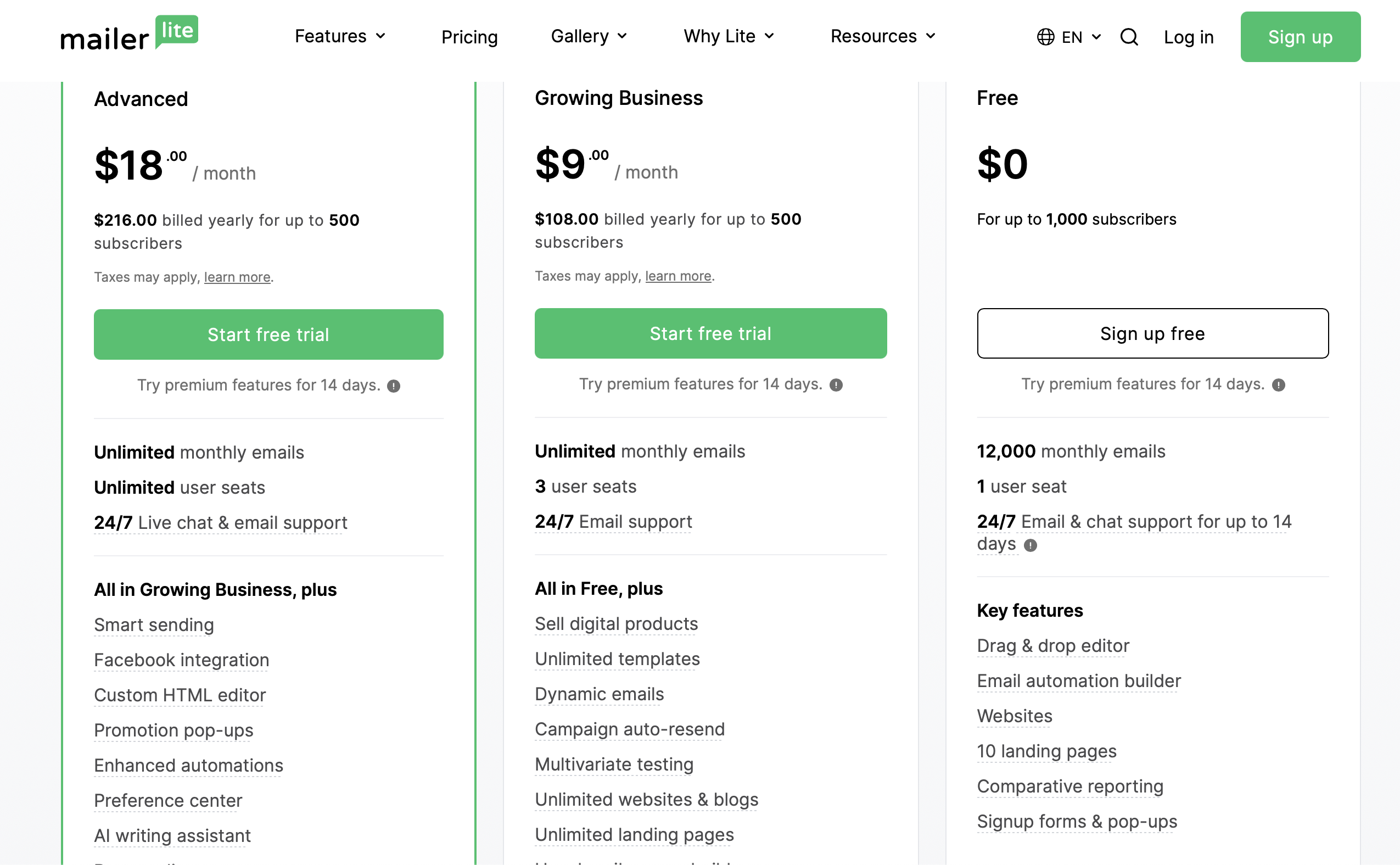
Unlike platforms that spike prices after certain thresholds, MailerLite keeps costs predictable. For small businesses or creators that are just starting, this MailerLite review shows it’s a cost-effective way to manage campaigns without sacrificing quality.
A broad feature set
What impressed me early on in my MailerLite review is what MailerLite is used for and how much it’s capable of. It’s far beyond just a newsletter software and email marketing platform.
You can build landing pages, create popup forms, and even design a full website with its broad feature set:
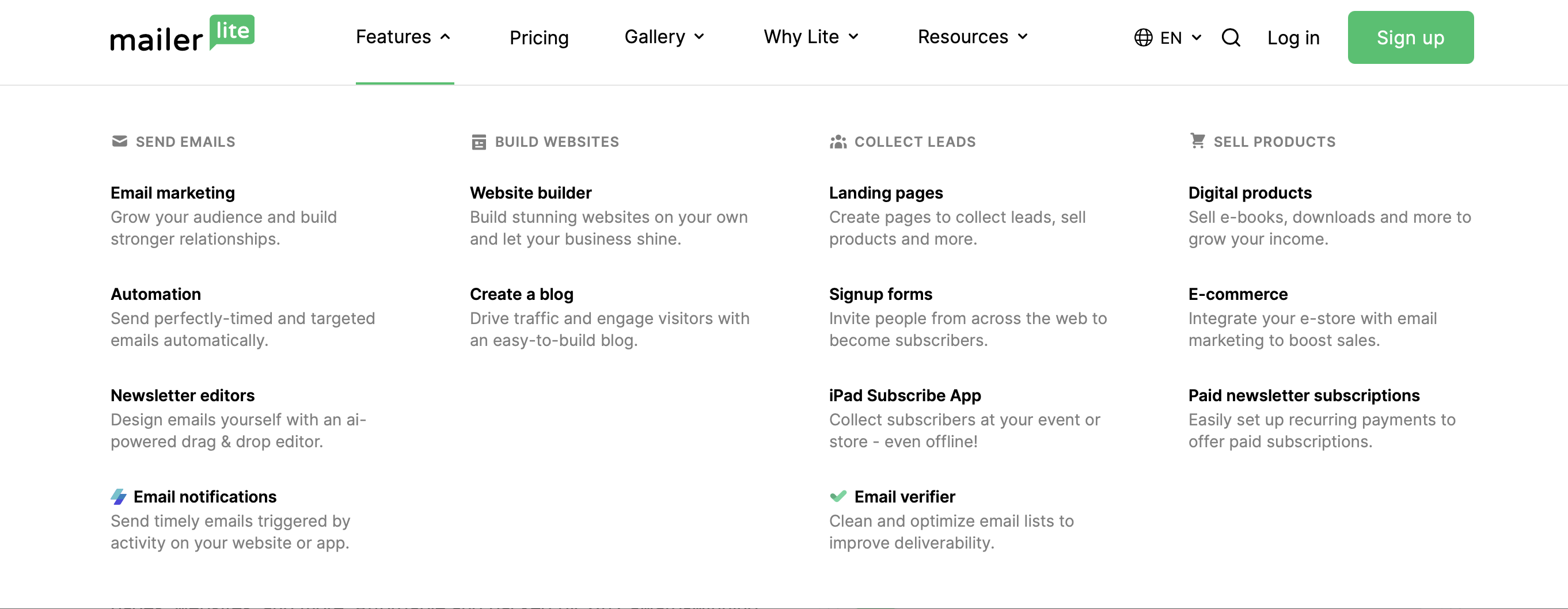
For selling digital products, the built-in Stripe integration makes it easy to set up payments directly from my pages. This combination of tools means I don’t have to juggle multiple apps for my basic marketing needs.
Capturing leads, showcasing products, and selling online courses, is hassle-free with MailerLite, with all the essentials in one place. For many small ecommerce brands, this “all-in-one” approach saves both money and time.
User-friendly interface
One of the first things I noticed when using MailerLite was how clean and uncluttered the interface feels. Everything is laid out logically, so I never had to dig through menus to find what I needed.
Creating an email was as simple as dragging and dropping elements into place, while setting up automation felt surprisingly straightforward, even for more complex sequences.
In this MailerLite review, I can confidently say that the minimal learning curve is a huge win, especially for beginners. Plus, there are helpful video tutorials built right into the platform to guide you step-by-step whenever you need extra support:
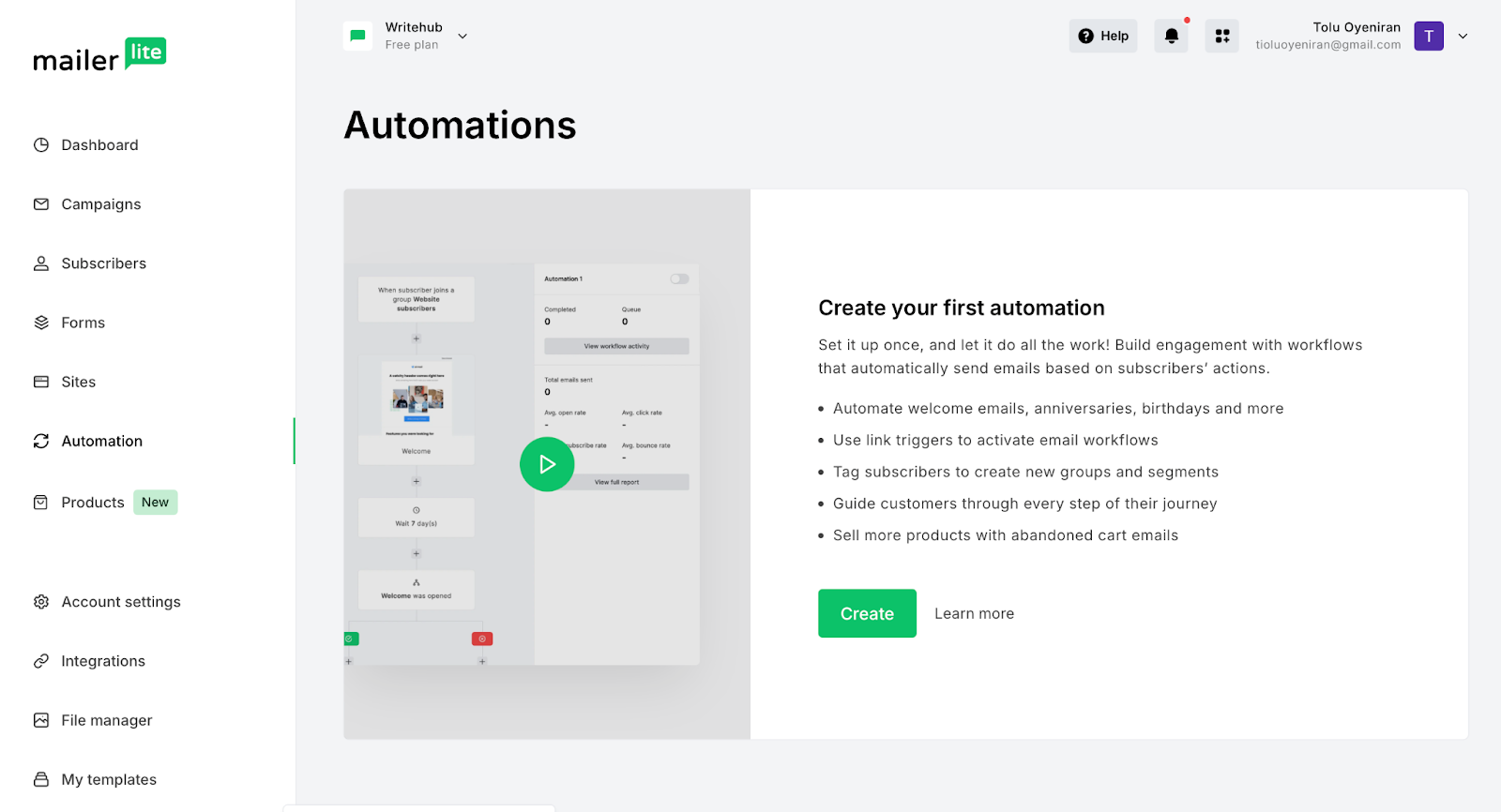
Seamless integrations with ecommerce platforms
In my MailerLite review, I found that this tool offers seamless ecommerce integrations. It connects natively with Shopify, WooCommerce, and over 140 other tools, so syncing customer and order data happens automatically:
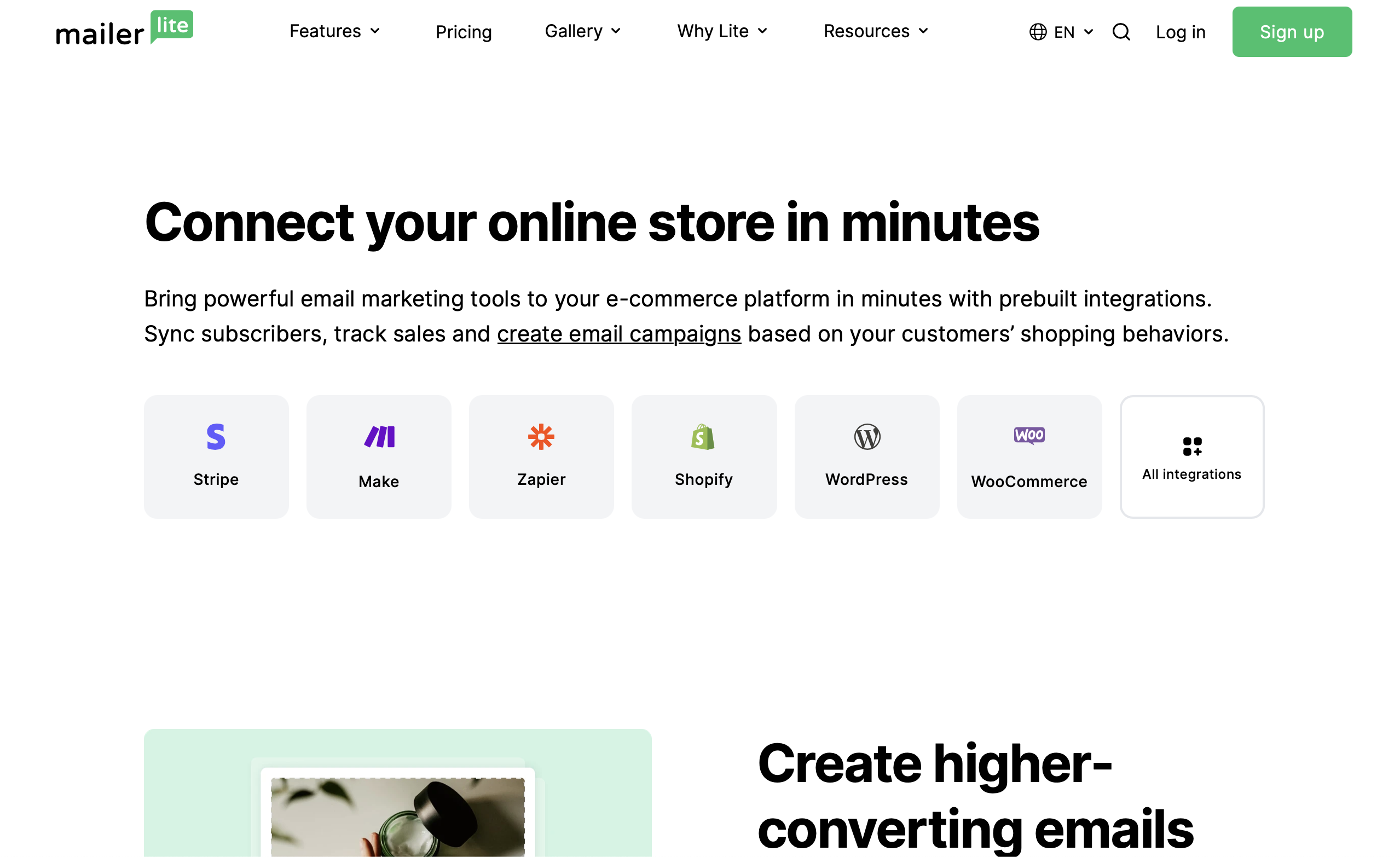
Once integrated, I could easily set up behavior-based campaigns like sending a thank-you email after a purchase or a reminder when someone abandoned their cart.
The process didn’t require coding or complicated setup. This allowed me to launch targeted campaigns in minutes.
For businesses already running online stores, this kind of integration keeps marketing aligned with sales activity, ensuring the right message reaches the right customer at the right time.
Powerful automation
I found during my MailerLite review that its automation features quickly became one of my favorite parts of the platform. Even on the Free plan, I could access an intuitive drag-and-drop workflow builder and several ready-made templates. Creating email automations like welcome emails, cart recovery reminders, and re-engagement sequences was also simple.
I could easily customize triggers and actions based on subscriber behavior, whether it was opening an email, clicking a link, or making a purchase.
The visual builder made it clear to see how each step flowed, which helped me fine-tune my campaigns for better results.
For small businesses, this level of automation is a major advantage over many other platforms, especially since it doesn’t come at an extra cost.
High email deliverability rates
One thing I value in any email marketing platform is knowing my messages will land in subscribers’ inboxes. MailerLite delivers here, with an impressive deliverability rate of 92.7%:
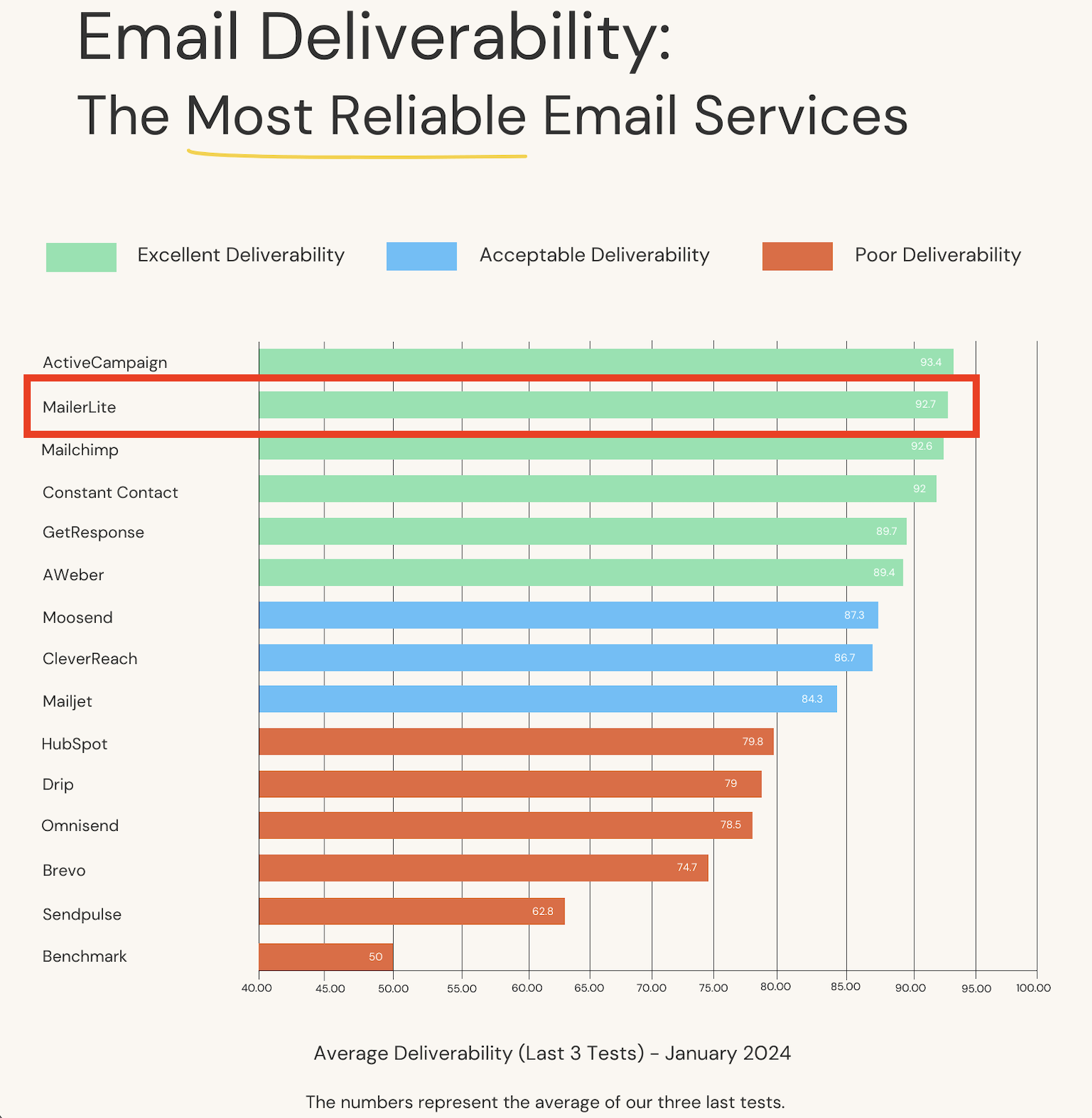
This is thanks to built-in authentication tools like DKIM and SPF, and a strict account approval process that keeps spammers off the platform. While that vetting can feel a bit tedious at first, it ultimately protects your sender’s reputation.
In my MailerLite review, campaigns consistently reached inboxes without ending up in spam folders. For anyone serious about email marketing, that reliability means higher open rates, better engagement, and overall, more sales opportunities.
Strong personalization and segmentation tools
Another thing I loved about MailerLite is its personalization and email segmentation features.
I discovered during this MailerLite review that the platform offers numerous options for delivering relevant messages. I can segment my audience based on behavior, demographics, or engagement levels to send highly targeted campaigns to each group.
Using merge tags, I personalized everything from subject lines to specific sections within an email. Dynamic content blocks allowed me to show different products or offers depending on a subscriber’s purchase history or location.
I could easily tailor product recommendations, run loyalty campaigns, or re-engage inactive customers. As a result, you can build stronger relationships and achieve better results without added complexity.
MailerLite review: Cons
While MailerLite has plenty of strengths, it’s not without its drawbacks. I wanted to highlight these in this unbiased MailerLite review since some of these might be deal-breakers depending on your marketing needs:
Missing advanced ecommerce tools
In my MailerLite review, I noticed the integrations with Shopify and WooCommerce were useful. However, the platform lacks certain advanced ecommerce features.
There’s no built-in support for dynamic discount codes, product-level revenue tracking, or AI-powered product recommendations.
These tools are standard in more specialized ecommerce marketing platforms, and without them, you may need to rely on third-party apps.
For stores that depend heavily on personalized offers or precise sales attribution, this limitation can be challenging. If you need more advanced ecommerce automation, you might find yourself outgrowing MailerLite sooner than expected.
Limited automation complexity on lower plans
MailerLite’s automation is great for beginners, but I quickly noticed its limits on lower-tier plans. While you can set up standard sequences, the platform doesn’t allow multi-trigger workflows or deep behavioral triggers by default.
That means more sophisticated campaigns, such as combining multiple user actions into a single automation, aren’t possible without upgrading.
For small lists, this might not be an issue, but for growing businesses with complex funnels, it can feel restrictive. If you rely on layered automations to drive conversions, you’ll likely need the highest tier to achieve that flexibility.
I’d like to highlight in this MailerLite review that free users can only use templates created during the trial period.
Basic reporting and analytics
When reviewing campaign performance for this MailerLite review, I found that the platform’s analytics is serviceable but limited. You get the basics — open rates, click-through rates, and unsubscribes — but not much beyond that.
There’s no built-in lifetime value (LTV) tracking, no social share metrics, and revenue attribution is basic at best. For data-driven teams that rely heavily on in-depth reporting to inform their marketing decisions, this can be a significant constraint.
You might find yourself exporting data into external tools or relying on third-party analytics to fill the gaps. While the simplicity works for beginners, advanced marketers may feel lost without more detailed information.
No built-in spam or email preview testing
Another area where MailerLite falls short is pre-send testing. The platform doesn’t offer client-specific email previews or spam scoring tools.
That means you can’t easily check how your message will look in different email clients or if it’s likely to be flagged as spam. So, users will have to rely on third-party tools to test the email’s layout consistency and avoid deliverability issues.
While this might not be an issue for small campaigns, it adds extra steps for teams that want to ensure layout consistency and optimal deliverability across devices.
Skipping these tests can increase the risk of rendering issues or missed engagement opportunities.
Strict account approval process
MailerLite enforces a thorough account vetting process, which can be a double-edged sword.
New users must verify their domain and wait for manual approval before sending campaigns. While this helps maintain high deliverability rates and protects the platform from spammers, it can also delay your first send — sometimes by days.
There have been instances of accounts being suspended mid-campaign due to compliance concerns, even when users believed they were following the rules.
For time-sensitive marketing or product launches, this extra friction can be frustrating, especially if you’re switching from a platform that allows instant sending.
Feature limitations on the Free plan
While MailerLite’s Free plan is generous in terms of subscriber allowance, it’s noticeably stripped down when it comes to features.
Automation templates, SMS marketing, advanced segmentation options, and many of the professionally designed email templates are locked behind paid tiers:
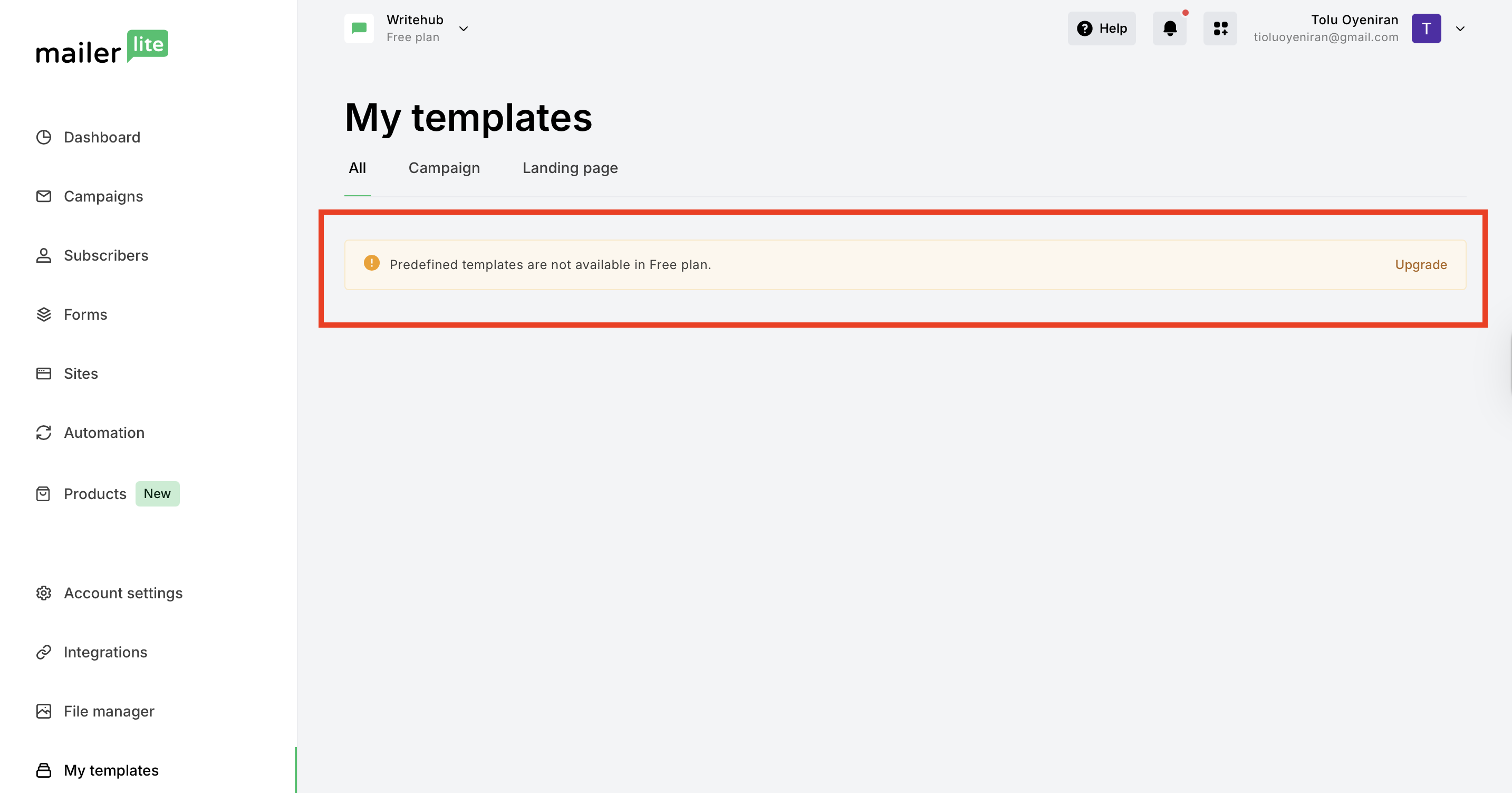
This means you can build basic campaigns, but scaling up your marketing efforts will quickly require an upgrade. For hobby projects or very small lists, the free version might suffice.
However, for anyone planning to run targeted, multi-channel campaigns, these restrictions can feel limiting. You’ll want to keep the potential upgrade cost in mind before committing to MailerLite as your long-term tool.
Limited customer support availability
Customer support is another area where MailerLite could improve. Live chat is reserved for paid users, and even then, it’s not available around the clock.
Free plan users have to rely on email support, which can mean waiting hours or even a full day for a response. While the knowledge base is well-organized and helpful, it can’t replace direct, real-time help when you’re facing urgent technical issues.
For businesses running time-sensitive campaigns, this limited availability may pose a risk, especially compared to competitors offering 24/7 support.
Final verdict: Is MailerLite worth it?
MailerLite is a good choice for small businesses, startups, and creators who want an easy and affordable tool for email marketing. It’s simple to set up and affordable, offering features like automation, landing pages, and basic ecommerce support.
From my MailerLite review, if you’re just starting, it can give you everything you need without breaking the bank. However, it may not suit your business if you need advanced ecommerce tools, deep automation, or detailed analytics.
If you’re running a growing online store or rely heavily on revenue-driven campaigns, you might quickly outgrow MailerLite’s feature set.
When comparing Omnisend vs. MailerLite, Omnisend provides more comprehensive ecommerce tools to help your business scale. This is why exploring a tool like Omnisend can be just what you need for advanced segmentation, automation, and sales tracking.
Omnisend: The better MailerLite alternative
If you’ve reached the limits of MailerLite’s automation, segmentation, or ecommerce features, Omnisend is a top MailerLite alternative to consider. Here are some of its standout features:
More powerful automation for customer journeys
Omnisend supports complex, multi-trigger workflows that span email, SMS, and push notifications. This enables true omnichannel marketing far beyond MailerLite’s simple automations.
You can design branching paths, add time delays, and personalize follow-ups that respond to customer behavior in real time. This means more relevant messages, higher engagement, and stronger customer loyalty for your brand.
24/7 live chat support
Omnisend offers responsive, 24/7 live chat support on all plans, including the free one. According to my reviews of MailerLite, support varies by plan and may not be available when you need urgent help.
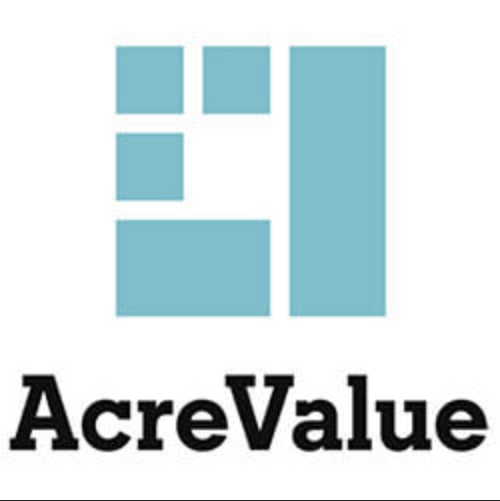 | “The most valuable part of working with Omnisend has been the customer support. Their team has been instrumental in guiding us through solutions that we simply couldn’t find elsewhere. From segmentation strategies to deliverability fixes, they’ve been there every step of the way.” — Ethan Rodriguez, Marketing Lead at AcreValue From a 5% to 70% open rate, see how AcreValue transformed email deliverability in weeks. Read the full story here. |
Better revenue tracking and campaign analytics
Omnisend connects every campaign to actual sales, giving you clear insights into your marketing ROI and customer lifetime value. You’ll see exactly which messages drive purchases, allowing you to refine your strategy with data-backed decisions.
When you look at what MailerLite is used for, it’s mainly email campaigns and landing pages. However, its reporting is limited. Omnisend’s advanced analytics go further, helping you scale campaigns with precision and confidence.
Faster onboarding and prebuilt workflows
With Omnisend, you can start selling faster, thanks to ready-to-use workflows for abandoned carts, post-purchase follow-ups, and product upsells. These templates are optimized for ecommerce success and save you hours of manual setup.
A recent MailerLite review shows that while the platform supports automation, you often need to build workflows from scratch. Omnisend’s prebuilt options get you campaign-ready in minutes, helping you launch and scale faster.
MailerLite review: FAQs
Yes. MailerLite offers a free plan for up to 1,000 subscribers and 12,000 emails monthly, which is ideal for small lists. However, if you need advanced features like automation templates and segmentation, you must upgrade to a paid plan.
MailerLite supports SMS marketing only on advanced paid tiers and in select regions. The feature is functional but limited. It doesn’t offer pinpointed targeting and automation you’d find in dedicated omnichannel marketing platforms like Omnisend.
Its main limitations are:
— Limited automation on lower plans
— Basic reporting and analytics
— No built-in spam or email preview testing
— Strict account approval process
— Limited customer support availability
Additionally, advanced features, including dynamic product recommendations and multi-trigger automation, require higher-tier subscriptions. This can pose a challenge for teams or businesses with a limited budget.
Yes. MailerLite integrates directly with Shopify, WooCommerce, and other ecommerce platforms.
However, compared to tools like Omnisend or Klaviyo, MailerLite’s ecommerce features are less advanced when it comes to personalized product recommendations and revenue tracking.
For ecommerce-focused businesses, Omnisend, Klaviyo, and ActiveCampaign offer stronger automation, better analytics, and multi-channel engagement.
These platforms also provide more advanced segmentation, dynamic content, and revenue attribution, making them a better fit for growing online stores.
TABLE OF CONTENTS
TABLE OF CONTENTS


No fluff, no spam, no corporate filler. Just a friendly letter, twice a month.

 OFFER
OFFER







